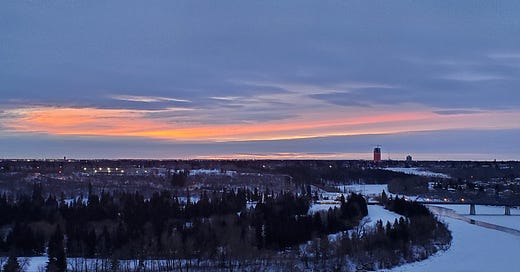In October 2013, in my first year of polyamory practice, I began writing a blog, The Critical Polyamorist. Posts began as personal reflections of the pleasurable, challenging, and eye-opening experiences of openly practicing consensual non-monogamy (CNM). I aimed to think through the personal challenge of this new way of relating by engaging in self-reflexive analysis combined with research in polyamory, sexualities, race, and Indigenous Studies literatures. Through blogging, I pondered personal, cultural, and structural challenges that settler-colonialism presents to pursuing CNM. I lived in Austin, Texas back in 2013. I have broadened my lens to include both the US and Canada after I moved to Edmonton, Alberta in 2015.
I have also pondered the capacity, in theory, of Dakota and other Indigenous worldviews to tolerate contemporary manifestations of consensual non-monogamy. I encounter barriers to CNM within Indigenous community too, especially as presented by the imposition of settler lifeways and values related to private property and heteronormative, couple-centric, nuclear family. Nine years after beginning a polyamorous life, I continue to write autoethnographic explorations in various venues, including in academic publications and sometimes on this Substack. Portions of the earlier Critical Polyamorist blog posts have been incorporated into published essays in edited volumes and journals. And they have informed interviews I’ve done on podcasts and in print.
In naming the Critical Polyamorist blog, I took the label “critical” not to downplay the critique in which polyamorists already engage as they live against the grain of our society’s compulsory monogamy. Polyamorous people are in some ways de-facto critical thinkers and actors in that they/we think it is possible to be in loving, committed relationships with multiple people simultaneously, with the consent of all involved. Polyamory is in this sense deeply critical.
But when I take up the label “critical,” it is also not redundant. I gesture to something beyond common polyamorous critiques of compulsory monogamy, but which do not consider the role usually of racist, colonial structures in the monogamy system. I draw on a broader tradition of “critical social theory,” meaning that analysis and critique of social problems is not only for the good of knowledge, but is geared toward social change. Critical social theory also traditionally draws insights from social science and humanities disciplines. My critical polyamory work brings critical social theory including analyses of Indigeneity, colonialism, race, and sex to analyze polyamorous life and politics from my perspective as a rural-born, now urban-dwelling feminist, and anti-racist Indigenous woman.
The 100s method and multiply relating
When I began writing the Critical Polyamorist, I lived on warm southern plains of lands now occupied by Austin, where I was a professor of anthropology at the University of Texas. It was during that time that I was introduced to the idea of writing “100s” as part of an online writing group initiated by my friend and colleague, also a University of Texas anthropologist, Circe Sturm. I immediately used my emergent 100s writing practice to also think through CNM. During the 2014-15 academic year, Sturm and I wrote weekly with five other women living in different parts of the continent. We each committed to write a 100 on the same day every week, and to share it with the group by e-mail. That way, on each of seven days of the week, a different woman wrote and shared her 100 with the group.
Circe Sturm explains the 100s concept and its history in her introduction to "100-Word Collective," a collection of 100s published in 2013 in the journal Voices in Italian Americana. Sturm explains that the 100-Word Collective originated with Emily Bernard at the University of Vermont in February 2009. Sturm was a part of one of the first 100s writing groups. Bernard's idea has since resulted in the founding of dozens of writing groups, including our own in 2014-15. In Emily Bernard's approach, a writer launches their piece from an idea, phrase, single word, or anything that resonates or sparks from the previous piece. There are no limitations for form, style, or subject. Bernard explains the process of writing 100s in group as something akin to “a Quaker Meeting—if the spirit moves you, speak. Otherwise, let’s enjoy each other’s words in silence, rich and voluptuous.”
Sturm explains that "One of the reasons so many of us are drawn to this abbreviated format is that it allows us to dialogue with other writers, even when our lives are extremely busy. We also feel freer to experiment with content, form and voice, and to risk vulnerability in our writing....Some ideas catch fire and never lose their burn. This seems to be one of them."
The Critical Poly 100s posted on my blog in my earlier days of writing them (and also available in print in Elissa Washuta & Theresa Warburton’s edited volume Shapes of Native Nonfiction: Collected Essays by Contemporary Writers), draw on my relations with both humans and more-than-humans. For my multiple loving relations are not only about humans. My most beloved stretch of this world is the North American prairies, my water loves are its rivers, whether as far south as lands presently called Texas or as far north as lands presently named Edmonton, where I am now a professor of Native Studies at the University of Alberta. I live at the edge of the North Saskatchewan River valley near central Edmonton where prairie meets park land, in Treaty 6 territory, a traditional gathering place for Indigenous peoples including Cree, Blackfoot, Métis, Nakota, and others.
My relationship practice that I sometimes describe as “more-than-monogamy,” loops relations with place and space into my understanding of intimate and dynamic constitutive relations. Referring to more-than-monogamy instead of non-monogamy, like referring to the more-than-human instead of the non-human, de-centers monogamy and the human respectively. Thus more-than-monogamy in my definition is not relegated to human or sexual relating. I love sex unapologetically, but I do not privilege sex among intimacies. Similarly, I do not privilege humans in my accounting of relations or relatives. I lodge without other humans most of the time. But my treasured companion most days is the North Saskatchewan River that flows just outside my south-facing windows, large as life.
My practice of relating intimately everyday with multiple knowledge forms also intersects my approaches to multiple relating with beings and spaces. It is true that I am a social scientist, humanist, and writer. But I also come from an Indigenous people who insist on relational knowledge production even under the imposition of settler hierarchies of life/not life, human/nonhuman, culture/nature, truth/myth, and material/spirit. Therefore, I do not separate and value humanistic forms of knowledge production from and over more-than-human and material observations and investigation. Though I am not a “natural” scientist, farmer, hunter, quarrier, or carver, I value the knowledge, nourishment, and forms such workers bring into being by their engagements with cells, elements, flora, fauna, and stone. And I know that Indigenous scientists, hunters, and quarriers, for example, also keep and constitute stories as they maintain relations with more-than-human relatives. This is so much more than “multidisciplinary” knowledge-making. Routing oneself respectfully between multiple bodies is another ethical roadmap—another way of inhabiting the world.
Nine 100s
Following are nine more recent 100s that focus on human and more-than-human relating in the prairie landscape where I currently live. Five of the 100s (indicated with an asterisk after the titles) were previously published in The Dalhousie Review, “Biophilia” issue, volume 100, number 3 in Autumn 2020. The title of each 100 is followed by the date on which it was written. In these vignettes, I document couplings as becoming together. Be warned, some are sexual and romantic. These ways of co-becoming (or frank talk about them) do not appeal to everyone. A couple of these 100-word vignettes document “spiritual” becomings, for lack of a better word. Mostly, these 100s document good relations. Although not-good relations and not-romantic relations—in both definitions of that word, love and idealism—are also the entangled relations that make and remake us into who we become. We do not alone become. And our becomings are not always ideal, or loving. We are also forged in part through the unromantic.
Flyer (3.24.19)*
The bright faced men who stand head-to-head with me, well pressed and with a tuque recall him. Like my "half-Asian" limo driver in chilly Durham who asked if I am too? Flyer nights over two, four times per month in my city. I bring him odd coloured wine in rolling tipped crystal when 13 hours remain before he sky climbs again. In return, I press him for 737 Max 8 knowledge. In return, he presses me, builds power, draws speed. We rise, limbs locked with the moon and descend in laughter until the melatonin grounds us into quiet night visions.
Fairy Sexy Godmother (8.21.19)*
It took months to search and decide on a river abode. So I lodged a month, then four with a spirited love. We laughed, kissed, hugged. I heated her kettle, pressed coffee in the starry purple-pink-dawned winter. I wrote for hours at an antique table. She fell from her lounge into online molecular archives, prairie histories. Epiphanies cracked open our silence. When the city spun into dark, she’d turn from her screen; gather herbs, potions, tonics, flesh. A fairy sexy godmother, she whirled ‘round the kitchen, concocting spells that mostly worked. Bibbidi-bobbidi-boo! Dinner! Poof! I curtsied rosé into perfect-fit glasses.
Mistress of the Shears (8.29.19)
Promiscuous traveler, my hair’s been run through by fingers from Cambridge to Denver, Berkeley to Tokyo, Auckland, Jakarta. Then I found her, my colorist domme, in a #YEG salon. Like Morticia with a burgundy gloss on her own dark locks. Black clad with powerful boots and erotic accounts, lips of steel purse: “I know you’re growing it. But I’LL take an inch.” From behind, her fingers encircle my neck. I shiver. Our eyes meet in the mirror. When we rinse, her palms cradle and caress my head, her own creation of flesh and dye. Her hands drip blood wine rivulets.
Love Hotel Fieldwork (8.30.19)*
Sultry-eyed man in a suit, you and I were stuck loveless in the months I lived with fairy sexy godmother. Unless she flew off on magical business. She adores you, of course! But privacy, you know. Had our city caught on like Tokyo? I Googled “love hotel, Edmonton.” Lo and behold, the conference hotel on Gateway near Whitemud sells six hours, discounted. You were Stony Plain scandalized, but oh did you smile. In my fieldwork, front desk staff are discreet. “Welcome, Ms. TallBear. Room 204.” You tapped the door minutes later. I pulled your tie. You leaned into the work.
Clare Man (8.30.19)
He does not miss Ireland. Calgary is home. Yet pipes and fiddles sustain him. As well as my nips and kisses and hair grazing his back. He is 50, his skin 35. Impossibly vanilla, even more than I. He prefers a hard missionary session. Not every lover can thrust with such force. He closes my barre-built legs, guides them to the ceiling straight like a pole, looks up to my toes on pointe, climb gauging. Instead, he embraces knees and thighs, resumes driving. We moan until late summer sundown. He texts me at a red light: “I feel so alive.”
Communion (9.04.19)*
I inhale him, an earthy, full, round red. I know mineral whites best, but he is no airier blanc, even one run through by rock. On Sundays, he raises hands to heaven, opened by scripture. I recognize that Christian fever. I did time in worship, exiting for good on the heels of a single line: “All Jews go to hell.” Oh hell no. This one is oddly non-evangelical: “No human is free of sin. Leave down your stones.” When he is grounded between prayers and flights, he implores me, take him hard inside. His blood, his flesh, my communion.
Cacao. Sea. Sweetgrass. Earth (10.10.19)*
Her 99% cacao voice melts over us, pressed together in well-hung space. At the art gallery book launch, perched on chairs too spare for ample bottoms, I trace the glass’s edge with a thumb’s soft inside. Not unlike how I graze your perineum. Lids close, lips open, tongue tip probes the rim. Italian tide rolls in, stone and gold. Then pulls back—a placid goblet sea. A drop on my chin. Aftertaste of cut prairie grass in that other teasing in-between, the border zone of nose and palate. I sip liquid earth in wine. I sip the sea from you.
Winona Quarantine (04.14.20)
I hunt cornstarch in cupboards, but yeast is my take. What isolationist bakers covet. In a stealth drive across the sunrise city, I take this offering to a love’s snow-dusted porch, her prize to find in morning light. I binge on decades-old mournful music and sail back across the bridge, the ice river. Are these notes nostalgia for the poverty of 20? When there was less, but more to die for? The medicine man who named our girl, Sweet Song Woman, said a Winona is protected until her own first is born. I remain protected. I worry for my daughter.
River Quantum: Instructions for Babygirl (05.13.20)
1/4 my ashes to be spread across the North Saskatchewan. When ice flows and is lit by sun at a bend in central Edmonton. 1/4 to be blown across the heavy Mississippi. Back to ancestors at Minneapolis, St. Paul. 3/8ths shall be offered up to the Big Sioux. Next to the old pow-wow grounds, make sure! That river is akin to my grandmother who fished its waters on close-to-home days when she did not venture to the Missouri. 1/8th, the remainders of me, shall be emigrated to the Corrib, my tumultuous river love near Galway’s cathedral where I cursed Columbus.

















Share this post